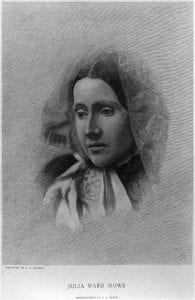
Basic Information
Julia Ward Howe was born on May 27th, 1819 in New York City. In her prestigious roles as an American author, poet, speaker, abolitionist, and suffragist, Howe influenced and inspired Americans across the country to advocate for human rights. By the time of her death at 91 years of age, Howe had established many organizations aimed at securing equal rights for women and the end of slavery for African American people. Though Howe faced many challenges throughout her long life, her determination to acquire liberty for women and other oppressed social classes never wavered.
Background Information
Wealthy and well-educated, Howe benefited from early exposure to educational subjects not commonly taught to girls in her time (Michals, 2015). Howe’s privileged connections afforded her a social circle consisting of inspirational poets and speakers such as Charles Dickens, Margaret Fuller, and Henry Wadsworth Longfellow (Grant, 1994). In 1843, Howe married her husband, Samuel Gridley Howe, and settled down to raise a family with him outside of Boston, Massachusetts (Adam Augustyn, et.al, 2019).
Though Howe was an important contributor to her husband’s newspaper, The Commonwealth, which promoted abolition, her spouse believed a woman should primarily be a homemaker and he severely limited her social and career prospects (Grant, 1994). Howe devoted herself to motherhood and furthering her own education but longed to involve herself in social justice causes. She began to write and publish poetry and other literary works, which strained her marriage and eventually caused Howe’s temporary separation from her husband in the mid 1850’s (Lewis, 2019). Having gained more freedom, Howe became increasingly involved in abolition and the crusade for women’s rights.
Contributions to the First Wave
Howe’s contributions to the first wave of the women’s suffrage movement began in 1868, when she helped found the New England Suffrage Association (Michals, 2015). After the founding of the NESA, a divide began to quickly form between suffragists who supported the 15th Amendment and those who did not. Howe was a strong supporter of the 15th Amendment and made the choice to break ties with the suffragists who opposed it. She went on to co-found the American Woman Suffrage Association in 1869 with fellow activist and friend, Lucy Stone (Michals, 2015). In 1870, Howe once again collaborated with Lucy Stone, this time starting the Woman’s Journal, which Howe would work on for the next 20 years of her life (Lewis, 2019).
Also, in 1870, Howe attempted to garner support for a women’s movement that opposed war and violence. Having seen the destruction and grief in the aftermath of the Civil War, Howe became a staunch believer in peaceful conflict (Lewis, 2019). Though the movement was unsuccessful, Howe went on to found many other successful associations devoted to peace, women’s rights and the end of slavery such as the New England Women’s Club (1871), the Association for the Advancement of Women (1873), the annual gathering of female ministers (1873), the National American Woman Suffrage Association (1889), and the General Federation of Women’s Clubs (1890) (Lewis, 2019).
In 1893, Howe traveled to Chicago to present her essay, Moral and Social Reform, to the Congress of Representative Women (Pfeffer, 2014). She continued to travel around the country, delivering impassioned speeches in support of women’s rights and abolition. By the time of her death in 1910, Howe had become the first woman ever to be inducted into the American Academy of Arts and Letters, an honor society comprised of the United States’ finest contributors to art, literature, and music (Michals, 2015).
“I therefore rejoice over my work, . . . hoping it may be of service to others, as it has certainly been to me.”
~Julia Ward Howe, (Richards, L.E., Elliott, M.H., & Hall, F.H., 1915).
Analysis and Conclusion
Julia Ward Howe was a pioneer of her time, as evidenced by her legacy of hard work, activism, and the founding of America’s first feminist coalitions. A victim of domestic violence and oppression at the hands of her own husband, Howe knew all too well the stifling limitations and expectations put upon the women of her time (Lewis, 2019). Her never-ending crusade for women’s rights and human equality makes Howe one of the most inspiring women and important historical figures in the history of the United States.
Though Howe had many supporters, she faced harsh criticism from her husband, who believed women should stay out of political affairs, and fellow suffragists like Elizabeth Cady Stanton and Susan B. Anthony, who were unhappy with Howe’s support of the black male voter (Grant, 1994). Howe is most widely known today for her creation of the Battle Hymn of the Republic in 1861; however, it can be argued that her contributions to the first wave of feminism are her most important and long-lasting gifts to American history.
References
,Augustyn, A., Bauer, P., Duignan, B., Eldridge, A., Gregersen, E., Luebering, J.E.,…Zelazko, A. (2019). Julia Ward Howe. Encyclopeadia Britannica. Retrieved from: https://www.britannica.com/biography/Julia-Ward-Howe
Grant, M.H. (1994). Private Woman, Private Person: An Account of the Life of Julia Ward Howe from 1819-1868 (Doctoral dissertation). George Washington University.
Lewis, J.J. (2019). Julia Ward Howe Biography: Beyond the Battle Hymn of the Republic, ThoughtCo. Retrieved from: https://www.thoughtco.com/julia-ward-howe-early-years-3529325
Michals, D. (2015). Julia Ward Howe, National Women’s History Museum. Retrieved from: https://www.womenshistory.org/education-resources/biographies/julia-ward-howe
Pfeffer, M. (2014). Southern Ladies and Suffragists: Julia Ward Howe and Women’s Rights at the 1884 New Orleans World’s Fair. Jackson, MS: University of Mississippi.
Powell, C.A. (1887). Julia Ward Howe from a Photograph by J.J. Hawes. The Century Co., New York. Retrieved May, 14, 2019 from Library of Congress. https://www.loc.gov/pictures/item/2009632078/
Richards, L.E., Elliott, M.H., & Hall, F.H. (1915). Julia Ward Howe, 1819-1910. Boston, MA: Houghton, Mifflin, & Co.